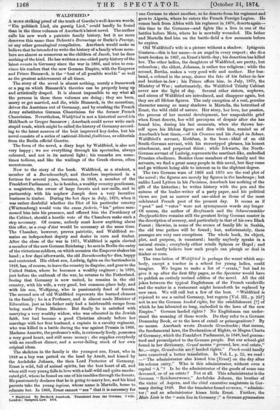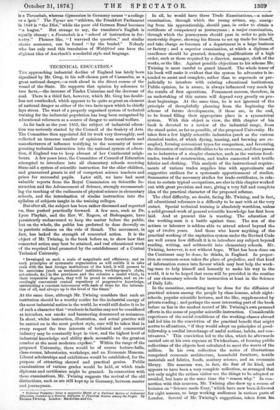WALDFRIED.*
A MORE striking proof of the truth of Goethe's well-known words, "Em politisch Lied, em n garstig Lied," could hardly be found than in the three volumes of Auerbach's latest novel. The author calls his new work a patriotic family history, but it no more deserves this name than Debrett's Baronetage or Burke's Peerage, or any other genealogical compilation. Auerbach would make us believe that he intended to write the history of a family whose mem- bers are almost as numerous as the children of Jacob, but he does nothing of the kind. He has written a one-sided party history of the latest events in Germany since the war in 1866, and tries to con- vince his readers that the new German Empire, with the Emperor and Prince Bismarck, is the "best of all possible worlds" as well as the greatest achievement of all times.
The story of the novel is almost nothing, merely a framework or a peg on -which Bismarck's theories can be properly hung up and artistically draped. It is almost impossible to say what all the persons in these three volumes are doing ; they are born, marry or get married, and die, while Bismarck, in the meantime, drives the Austrians out of Germany, and by crushing the French Army substitutes German Chauvinism for the former French Chauvinism. Nevertheless, Waldfried is not a historical novel a /a Miihlbach or Gregor Samarow ; Auerbach could never write such stupid trash, which might be called the history of Germany accord- ing to the latest sources of the best improved key-holes, but his novel consists of a series of national-liberal feuilletons, or editorials from the Berlin official Gazette.
The form of the novel, a diary kept by Waldfried, is also not very happy ; we see everything through his spectacles, always coloured, and not in its natural light ; his remarks are some- times tedious, and like the wailings of the Greek chorus, often monotonous.
Now to the story of the book. Waldfried, as a student, a member of a Burschenschaft, and therefore imprisoned in a fortress for several years, becomes, in 1848, a member of the Frankfort Parliament ; he is besides, a wealthy country gentleman, a magistrate, the owner of large forests and saw-mills, and in partnership with his nephew Joseph does a very lucrative business in timber. During the hot days in July, 1870, when it was rather doubtful whether the Diet of his particular country (Wiirtemberg) would vote the cctsus fcederis, "his" prince sum- moned him into his presence, and offered him the Presidency of the Cabinet, should a hostile vote of the Chambers make such a step necessary. Of course, nobody must know anything about this offer, as a coup d'elat would be necessary at the same time. The Chamber, however, proves patriotic, and Waldfried re- mains an independent deputy and dealer in corn and timber. After the close of the war in 1871, Waldfried is again elected a member of the new German Reichstag ; he sees in Berlin the entry of the victorious soldiers, on which occasion the Emperor shakes his hand ; a few dayiafterwards, the old Burschenschafter dies, happy and contented. His eldest son, Ludwig, fights on the barricades in 1848, has, of course, to leave the country in disguise, and goes to the United States, where he becomes a wealthy engineer ; in 1870, just before the outbreak of the war, he returns to the Fatherland. Seeing that Germany is now united, he remains in the old country, with his wife, a very good, but common-place lady, and with his son, Wolfgang, who is passionately fond of forests. The second son of old Waldfried represents the learned element in the family ; he is a Professor, and is almost made Minister of Education, just as his father only had a hairbreadth escape from being made Prime Minister. But finally he is satisfied with marrying a very wealthy widow, who was educated in the Jewish faith, but had become a good Christian already before her marriage with her first husband, a captain in a cavalry regiment, who was killed in a battle during the war against Prussia in 1866. Madame Annette, the professor's wife, is extremely lively, possesses a very good heart, and still more money ; she supplies everybody with an excellent dinner, and a never-failing stock of her own original ideas.
The skeleton in the family is the youngest son, Ernst, who in 1848 as a boy was patted on the head by Arndt, and kissed by the Archduke Johann, the then Lord Protector of Germany. Ernst is wild, full of animal spirits, has the best heart of all, and when still very young falls in love with a half-wild and quite unedu- cated girl, whom he found on one of his rambles through the forests. He passionately declares that he is going to marry her, and his kind parents take the young ingenue, whose name is Martella, home to educate her. In 1866, Ernst cannot " see " that it is necessary for
• Waldfried. By Berthold Auerbach. Translated from the German. 8 vols. London ; Sampson Low. 1874.
one German to shoot another, so he deserts from his regiment and goes to Algeria, where he enters the French Foreign Legion. He comes back from Africa with his regiment in 1870, deserts again— this time to the Germans—and fights like a lion in one of the battles before Metz, where he is mortally wounded. His father and Martella find him on the battle-field a few moments before he expires.
Old Waldfried's wife is a picture without a shadow. Iphigenia Gustava—this is her name—is an angel in every respect ; she diis heart-broken in 1867, on Ernst's birth-day; his desertion has killed her. The other ladies, the daughters of Waldfried, are pretty, but colourless ; the eldest, Johanna, is rather too religious ; while the second, Bertha, makes a very good wife and mother. Her hus- band, a colonel in the army, shares the fate of his father-in-law and brother-in-law ; his Prince offers him, in July, 1870, the Ministry of War ; unfortunately, the Waldfried Trinity Cabinet never saw the light of day. Several other sisters, nephews, and nieces of Waldfried are introduced, and disappear again, but they are all lifeless figures. The only exception of a real, genuine character among so many shadows is Martella, the betrothed of Ernst, the wild child of nature. Her story, her love, her passion, the process of her mental development, her unspeakable grief when Ernst deserts, her wild paroxysm of despair after she has found him, during his last moments, when she throws her- self upon his lifeless figure and dies with him, remind us of Auerbach's best times,—of his Crescenz and his Joseph im Schnee. Waldfried's servant, Rothfuss, is the beau - ideal of an old South-German servant, with his stereotyped phrases, his honest attachment, and perpetual thirst ; while Ickwarte, the North- German servant of Ludwig, represents the martinet-like, embodied Prussian obedience. Besides these members of the family and the servants, we find a great many people in this novel, but they come and go without being able to interest us. in the slightest degree.
The two German wars of 1866 and 1870 are the real plot of the novel ; the figures are merely lay figures in the landscape ; but unlike Lord Lytton in his Parisians, Auerbach has nothing of the gift of the historian ; he writes history with the pen and the animus of the leader-writer of a party paper, and his political views are just as narrow and one-sided as those of the most celebrated French poet of the present day. It seems as if " poet " and " vales " were not synonymous words any longer Of course, the author of Barfuessele and the Schwarzwaelder Doygeschichten remains still the greatest living German master in the description of scenery, and particularly in that of his own Black Forest ; likewise, in some of the scenes of family life in Suabia, the old true pathos will be found ; but, unfortunately, these passages are very rare exceptions. The whole book, its object, plot, and purpose, is unnatural ; hardly anybody speaks in a natural strain ; everybody either retails Spinoza or Hegel ; and we can hardly believe how such people can plough or deal in timber or corn.
The trangation of Waldfried is perhaps the worst which any- body, except a teacher in a school for young ladies, could imagine. We began to make a list of "errata," but had to give it up after the first fifty pages, as the Spectator would have to publish an entirely revised edition of the novel. All the old jokes between the typical Englishman of the French vaudeville and the waiter in a restaurant might henceforth be replaced by new ones. We will cull but a few of the best. "Waldfried is rejoiced to see a united Germany, but regrets [Vol. LEL, p. 2571] not to see the German landed rights, for the establishment [?] of which he has laboured so long, embodied in the laws of the new Empire." German landed rights ? No Englishman can under- stand the meaning of these words. Do they refer to a German Domesday Book, or to the laws of entail or primogeniture? By no means. Auerbach wrote Deutsche Grundrechte; that means, the fundamental laws, the Declaration of Rights, or Magna Chasta of Germany, which the Frankfort Parliament, in 1848, had guaran- teed and promulgated to the German people. But our school-girl found in her dictionary, Grand means "ground, law, real estate," &c.,—ergo, Grundrechte axe:f, landed rights." Punch could hardly have conceived a better translation. In Vol. I., p. 35, we read : —" The administrator also kissed him [Ernst] on the day after his solemn entry." Who is this administrator, without even a capital " A "? Is he the administrator of the goods of some one deceased, or of an estate? Not at all. This administrator is the German " Reichsverweser," Archduke Johann, the brother of ' the victor of Aspern, and the chief executive magistrate in Ger- many during 1848. But the translator found verwesen, " adminis - !ter ;" and an administrator kisses little Ernst. Further, the 1 Main Linie is the "main line in Germany ;" a German gymnasium is a Turneehule, whereas Gymnasium in Germany means "a college or a lyede." The Turner are "athletes, the Frankfort Parliament in 1848 is "the Diet," while the poor old German Bund becomes "a league." But strange to say, the translator's English is equally clumsy ; a Forsischule is a "school of instruction in for- restry." Phrases like, "I wavered the question," and similar choice sentences, can be found "by the bushel" Nobody who has only read this translation of Waldfried can have the slightest idea of Aucrbach's wonderful style and language.







































 Previous page
Previous page